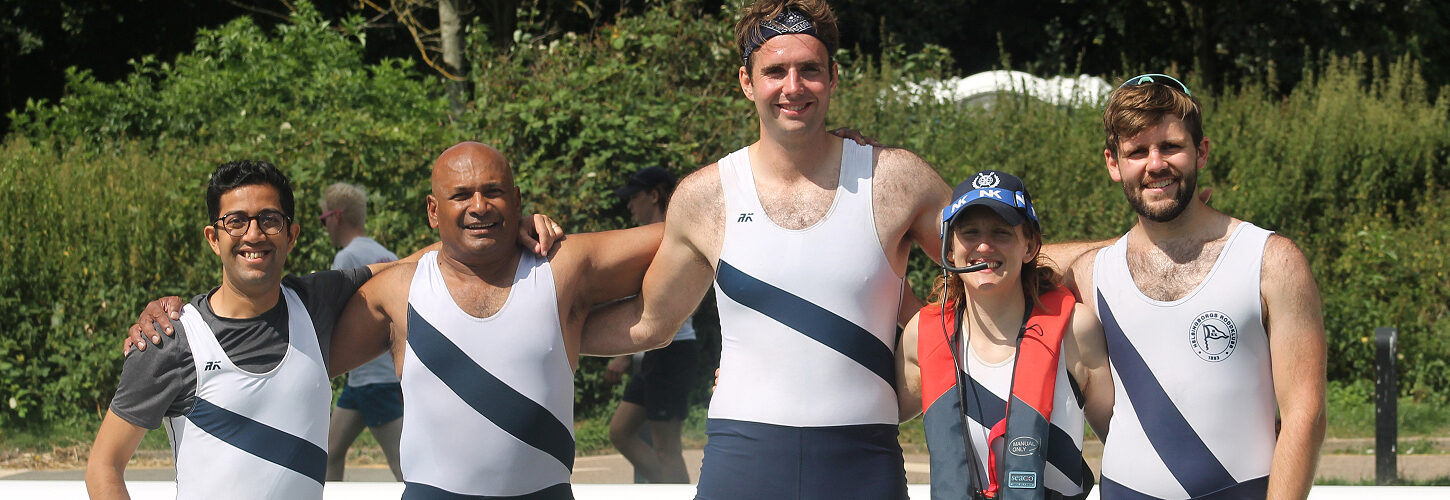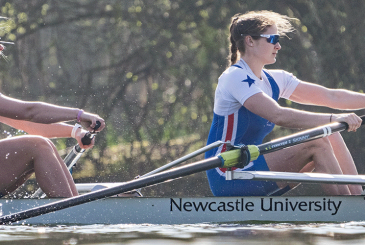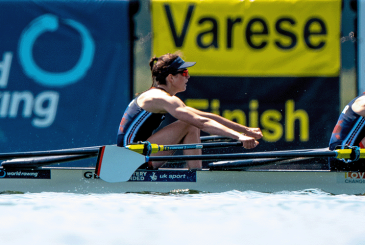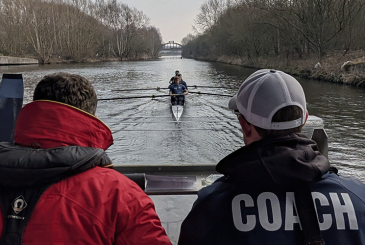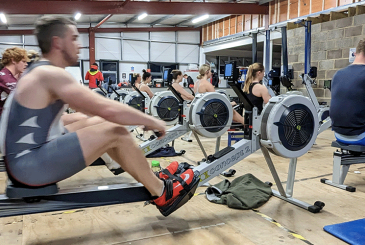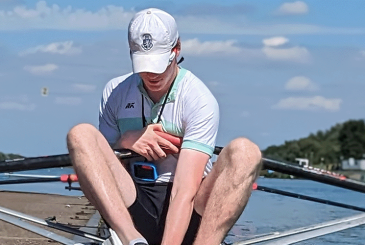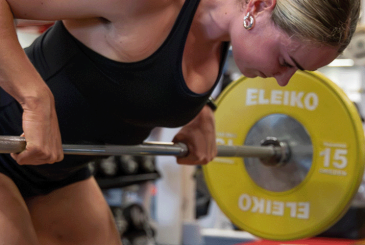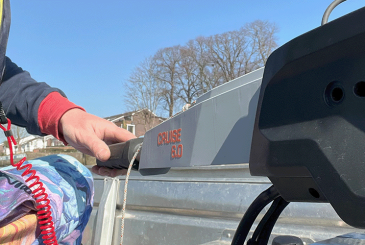Globe Rowing Club has a five-year coaching development plan so it can welcome more people from the local community to the club. Development coach Jess Strangward tells Catherine Larner about her journey with Globe
With thousands of ideas fizzing in her head, Jess Strangward needs structure, consistency and accountability to manage her Attention Deficit Hyperactivity Disorder (ADHD). And she’s found that rowing has proved the perfect antidote.
“Exercise is good,” she says, “but this is a sport which engages you mentally as well as physically. Rowing is repetitive, dependable and soothing, and it’s the only thing which shuts up the noisy half of my brain so that the other half can think. Rowing is honestly the quietest place I can be.”
Having long had a yearning to try rowing, it was sampling all the Olympic sports in 2012 that finally set her on the path. She discovered Globe Rowing Club through a Google search when she moved to south-east London in 2015 and immediately embarked on a learn to row course.
“It was very intense,” she says. “Twelve weeks, three sessions a week. My favourite thing was Alan the boatman alongside in the launch shouting ‘Relaaax! Relaaax!’ At the end of the course, I thought I was a really great rower… and then they put us into a fine boat!”
She soon perfected her technique, grew in confidence and became a high-performance rower where club co-captain Chris Webber and women’s captains Laura Northwood and Sara Ross soon recognised her potential, not just in the sport but also her contribution to the club.
“I am a bit of joiner of things,” Jess says. “Very quickly, when they asked for people to help, I’d be ‘me, I’d love to help, I love helping.’ I volunteered for everything.
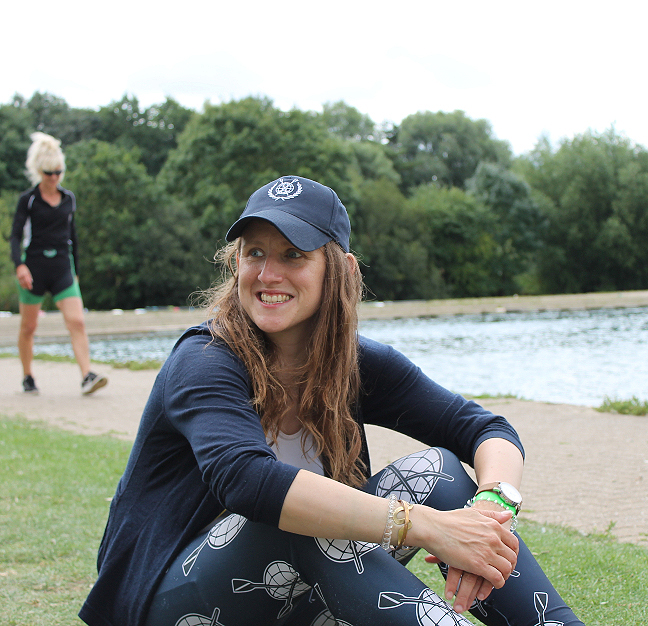
“Rowing is a solo sport that’s done in a team and that’s what attracted me to it, the feeling that everyone’s got to be there. You have to show up, otherwise you’re ruining everyone else’s day. I could not let people down.”
“I see ADHD as her superpower!”
“Jess is somebody who will do anything for anyone,” says Chris. “She is fabulous. I find it fascinating that Jess is who she is and does so much for so many people. I love watching women’s confidence build through the sport, but Jess’s journey, having ADHD, has to be unique compared to other rowers.”
Outside Globe, Chris has experience of communicating with people with special needs and mental health issues, as well as ADHD. He is therefore aware of what Jess has to contend with, but also how much she can contribute.
“Women with ADHD present differently than men,” he says. “They can appear dithery or appear to daydream. They are thinking about 12,000 things at once, and they can’t break down those thoughts to prioritise them. But when they know things, they can think laterally and are able to deliver very effectively. Working with Jess, it’s clear she is very structured and can deliver great results. I see ADHD as her superpower!”
“I think through coaching, she will enhance people’s lives and it will also give a lot of value to her life too”
While her competition hopes have been dashed, for now, by two significant injuries, Jess has long been in demand as a cox and also took on the role of equipment officer. “I am very hands on, and I love loading trailers and moving boats for competitions. It’s so much fun. Not only is there the sport, but there are all these logistics!” she says. “I also understand now why boatmen are so curmudgeonly – because people are always breaking things and never putting things back!”
Naturally engaging, encouraging and interested in people, Jess was invited to work towards coaching qualifications through a new initiative launched at Globe.
“For years Jess has been in the corner, in the dark, sorting the equipment, not getting much reward,” says Chris. “But she’s got a good eye, and she’s really inspiring for people. I think through coaching, she will enhance people’s lives and it will also give a lot of value to her life too.”
Jess is working towards her UKCC Level 2 Coaching qualification in what the club is calling its ‘coaching hub’. There are currently two other participants and they each have their training paid for by the club in return for them coaching Globe members for free.
“We don’t have the income streams that other clubs do, yet we’re a club that invites everyone into rowing,” says Chris. “We need to have as many coaches as possible working with different people in the club. For the next five years our development plan is about building leadership skills for coxing or coaching. We are learning as we go, and Jess is our guinea pig!”
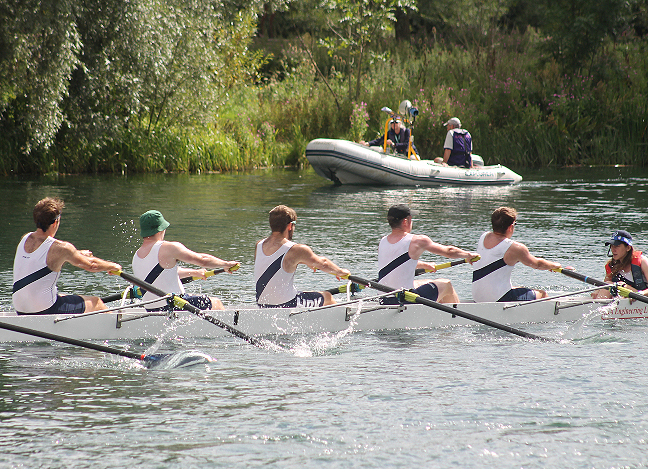
“I’d been doing so much coaching already,” says Jess. “Coxing was such a good way to learn about rowing. You start to become a coach as soon as you’re a cox. I’d taught many people to row and was beginning to coach in the gym sessions too. But it’s weird – someone gives you that word ‘coach’ and suddenly you really feel out of your depth.”
The director of rowing at the club, Maurice Coughlan, is seeking to build Jess’s confidence in the role as well as developing her technical and communication skills.
“It’s a whole new language,” says Jess. “But only one person in my whole boat at the weekend had English as their first language. And I’m teaching them boat language on top of that.
“I have tried to reduce the amount of knowledge and the amount of coaching I give, to focus on a couple of things at a time – though this is something I find difficult because of my brain wanting the next thing and the next thing.”
The club is already reaping the rewards of its focus on coaching. “In just one season we’ve done amazing things because of the coaching direction,” says Chris. “We realised that in order to deliver good race training and results, you need good coaching, and to do that you need depth across the club.”
Globe, which celebrates its centenary in 2023, is based over two sites on the River Thames. It shares a gym and clubhouse with Curlew at the Trafalgar Rowing Centre at Greenwich and partners the Royal Docks Watersport Centre in Newham. Accessing two different stretches of water, they’re able to train for both head races and regattas, running programmes across the board for juniors aged 12 to 18, and seniors 18 to 80.
“I see ourselves as the guardians of something very precious, here at Globe”
Since April membership has more than doubled to 120, and they have had had two qualifying crews at Henley, and a silver-medal win at the British Championships. The hope is, through open days, work with schools and partnerships with the local councils, to reach further into the community, even possibly offering programmes for the unemployed.
Jess is clearly an ambassador for how rowing has contributed to her life and wellbeing.
“I loved Globe immediately,” says Jess of joining the club. “Its history is in the people who worked on the river. And I’m obsessed with the Thames. I’m never not excited to be on the river. I see ourselves as the guardians of something very precious, here at Globe. One of our older members said: ‘cut me and I bleed Globe’. Their love of the club and how much they’ll show up for it, I still find very moving.”
And it’s evident that Globe is a caring and considerate club. “I remember when I was training in the gym and finding it all too much pressure,” Jess says. “My captain, Sara sent me a text, which I still read occasionally. She said ‘we just want the best for you, even if that’s not rowing’. I think someone being that supportive really made a difference.”
There is a great community at Globe, she says. “I think having a constant flux of new people forces you to be more open – you’ve got to talk to new people. Sometimes I think my heart can’t grow to take in any more rowers, but it always can. I think you build such a bond with people through shared experiences in a boat. Rowing gives you such a connection.”


